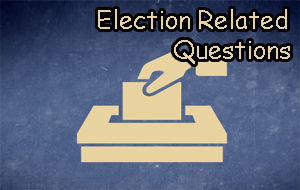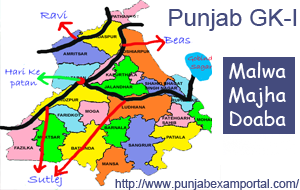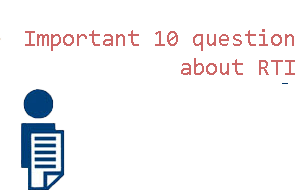
Election Related Important Question (For Department Of Local Government, Exam)
Click here for Election Related MCQs
https://www.punjabexamportal.com/11052024/2015/09/19/election-related-mcq-for-department-of-local-government-exam/
Q-1. What is the composition of Parliament of India?
Ans. According to Article 79 of the Constitution of India, the Parliament consists of President of India and the two Houses of Parliament known as Council of States (Rajya Sabha) and House of the People (Lok Sabha).
Q-2. Who elects the President of India?
Ans. The President is elected by the members of an electoral college consisting of the elected members of both the Houses of Parliament and the elected members of the Legislative Assemblies of States and the Union Territories of Delhi and Pondicherry.
Q-3. What is the manner of election of President?
Ans. According to Article 55 of the Constitution, as for as practicable, there has to be uniformity in the scale of representation of the different states at the election of the President. For the purpose of securing such uniformity among the States, the number of votes to which each State is entitled is determined as follows:-
(a) every elected member of the legislative assembly of a State shall have as many votes as there are multiples of one thousand in the quotient obtained by dividing the population of the state by the total number of elected members of the Assembly;
(b) If after taking the said multiples of one thousand, the remainder is not less than five hundred, then the vote of each member shall be further increased by one;
(c) each elected member of either House of Parliament shall have such number of votes as may be obtained by dividing the total number of votes assigned to the members of the State Legislation Assemblies by the total number of elected members of both the House of Parliament fractions exceeding one-half being counted as one and & other fractions being disregarded. The election of the President shall be held in accordance with the system of proportional representation by means of the single transferable vote and the voting shall be by secret ballot.
Q-4.What is the term of office of President?
Ans. The President shall hold office for a term of five years from the date on which he enters upon his office.
Q-5. Will there be any situation in which the President demits office before the five year term?
Ans. Yes There will be two such situations. The first is when the President resigns his office by writing under his hand addressed to the Vice-President and the second when the President is removed from office by impeachment for violation of the constitution.
Q-6. What is the procedure for impeachment of the President?
Ans. According to Article 61 of the Constitution, when a President is to be impeached for violation of the Constitution, the charge shall be preferred by either House of Parliament. No such change shall be preferred unless (a) the proposal to prefer such change is contained in a resolution which has been moved after at least fourteen days’ notice in writing signed by not less than one-fourth of the total number of members of the House has been given of their intention to move the resolution, and (b) such resolution has been passed by a majority of not less than two-third of the total membership of the House.
Q-7. Is the President eligible for election for a second term?
Ans. Yes According to Article 57 of the Constitution, a President is eligible for re-election to that office.
Q-8. What are the qualifications for election as President?
Ans. According to Article 58 of the Constitution, no person shall be eligible for election as President unless he is a citizen of India, has completed the age of thirty-five years and is qualified for election as a member of the House of the People. A person shall not be eligible if he holds any office of profit under the Government of India or the Government of any State or under any local or other authority subject to the control of any of the said Government.
Q-9. Can a Member of Parliament or the State Legislature become the President?
Ans. The President shall nor be a member of either House of Parliament or of a House of the Legislature of any state and if any such member is elected President he shall be claimed to have vacated his seat in that House on the date on which he enters upon office as President.
Q-10. Who elects the Vice-President of India?
Ans. The Vice-President is elected by the members of an electoral college consisting of the members of both House of Parliament.
Q-11. What is the manner of election of Vice-President?
Ans. The election is in accordance with the system of proportional representation by means of the single transferred vote and the voting is by secret ballot.
Q-12.What is the term of office of Vice-President?
Ans. The Vice-President shall hold office for a term of five years from the date on which he enters upon his office.
Q-13. Will there be any situation in which the Vice-President demits office before the five-year term?
Ans. Yes There will be two such situations. The first is when the Vice-President resigns his office by writing under his hand addressed to the President and the second when he is removed from office.
Q-14. What is the procedure for removal of the Vice-President?
Ans. The Vice-President may be removed from his office by a resolution of the Council of States by a majority of all the members of the Council and agreed to by the House of the People. No such resolution shall be moved unless at least fourteen days’ notice has been given of the intention to move the resolution.
Q-15. What are the qualifications for election as Vice-President?
Ans. According to Article 66 of the constitution, no person shall be eligible for election as Vice-President unless he is a citizen of India, has completed the age of thirty-five years and is qualified for election as a member of the Council of States. A person shall not be eligible if he holds any office of profit under any local or other authority subject to the control of any of the said Governments.
Q-16. Is there any provision for challenging the election of President or Vice-President?
Ans. Yes According to Article 71 of the Constitution, all doubts and disputes arising out of or in connection with the election of a President or Vice-President shall be inquired into and decided by the Supreme Court. Further, according to section 14 of the Presidential and Vice-Presidential Elections Act, 1952, an election petition can be filed before the Supreme Court.
Q-17 What can be the maximum number of members of Rajya Sabha?
Ans. 250 The maximum number of members of Rajya Sabha can be 250. Article 80 of the Constitution of India provides that 12 members are to be nominated by the President of India and not more than 238 representatives from the States to be elected by the elected members of the State Legislative Assemblies in accordance with the system of proportional representation by means of the single transferable vote.
Q-18. Are they all elected?
Ans. No All of them are not elected. As mentioned above, 12 are nominated and 238 are to be elected.
Q-18 A. What is the present strength of Rajya Sabha?
Ans. 245 Members. 12 are nominated and 233 are elected.
Q-19. What is the life of Rajya Sabha?
Ans. Rajya Sabha is a Permanent House and is not subject to dissolution as per Article 83 (1) of the Constitution of India. But as nearly as possible, one third of its members shall retire every 2nd year and an equal number of members are chosen to replace them.
Q-20. Who elects the members of the Rajya Sabha?
Ans. Elected members of the State Legislative Assemblies Article 80(4) of Constitution of India provides that members of Rajya Sabha shall be elected by the elected members of State Legislative Assemblies through the system of proportional representation by means of the single transferable vote.
Q-21. Who nominates the members of the Rajya Sabha?
Ans. President of India The President of India nominates 12 members of Rajya Sabha as mentioned earlier.
Q-22. Is there any special qualification for nomination?
Ans. Yes Article 80 (3) of the Constitution of India provides that the members to be nominated by the President to Rajya Sabha should have special knowledge or practical experience in matters like literature, science, art and social service. Article 84 (b) stipulates that a person shall be of not less than 30 (Thirty) years of age.
Q-23. What is the term of Lok Sabha?
Ans. Normal Term : 5 years Article 83 (2) of the Constitution stipulates that Lok Sabha shall have a normal term of 5 years from the date appointed for its first meeting and no longer. However, the President may dissolve the House earlier.
Q-24. What can be the maximum number of members of the Lok Sabha?
Ans. 550 The maximum number of elected members of Lok Sabha is 550. Article 81 of the Constitution provides that not more than 530 members will be elected from the States and not more than 20 members from Union Territories. Article 331 of the Constitution provides that not more than 2 members from the Anglo Indian Community may be nominated by the President of India, if in his opinion that community is not adequately represented in that House.
Q-25. How are the members of Lok Sabha elected?
Ans. Under Sec 14 of Representation of People Act 1951, the President of India by a notification will call upon the constituencies to elect their members to the House of People. Thereafter the electors of the Parliamentary Constituencies will directly elect the Lok Sabha members. As per article 326 of the Constitution of India, elections to the House of the People shall be on the basis of adult suffrage.
Q-26. How many members are elected by the electors of a Parliamentary Constituency?
Ans. One Each Parliamentary Constituency will elect only one member.
Q-27. Was this the position from the very beginning?
Ans. No Prior to 1962, there were both single – member and multi member constituencies. These multi – member constituencies used to elect more than one member. The multimember constituencies were abolished in 1962.
Q-28. When was the 1st general election held in India?
Ans. 1951-52 The first general election was held in India during 1951 – 1952.
Q-29. At that time, what was the total strength of the Lok Sabha?
Ans. The total strength of Lok Sabha at that time was 489.
Q-30. Which authority conducts elections to the offices of the President and Vice-President of India ?
Ans. Election Commission of India (ECI)
Under Article 324(1) of the Constitution of India, the Election Commission of India, interalia, is vested with the power of superintendence, direction and control of conducting the elections to the offices of the President and Vice-President of India. Detailed provisions are made under the Presidential and Vice Presidential Elections Act, 1952 and the rules made thereunder.
Q-31. Which authority conducts elections to Parliament?
Ans. Election Commission of India (ECI) The same Article 324 also vests in the Commission the powers of superintendence, direction and control of the elections to both Houses of Parliament. Detailed provisions are made under the Representation of the People Act, 1951 and the rules made thereunder.
Q-32. Which authority conducts elections to the State Legislative Assemblies and Legislative Councils?
Ans. Election Commission of India (ECI) Article 324 (1) also vests in the Commission the powers of superintendence, direction and control of the elections to both Houses of the State Legislature. Detailed provisions are made under the Representation of the People Act, 1951 and the rules made thereunder.
Q-33. Which authority conducts elections to Corporations, Municipalities and other Local Bodies ?
Ans. The State Election Commissions (SECs) The State Election Commissions constituted under the Constitution (Seventy-third and Seventy-fourth) Amendments Act, 1992 for each State / Union Territory are vested with the powers of conduct of elections to the Corporations, Muncipalities, Zilla Parishads, District Panchayats, Panchayat Samitis, Gram Panchayats and other local bodies. They are independent of the Election Commission of India.
Q-34. What is the present composition of the Election Commission?
Ans. A Three – Member Body At present, the Election Commission of India is a three-member body, with one Chief Election Commissioner and two Election Commissioners.
Q-35. Has the Election Commission been a multi-member body from the beginning?
Ans. No. It was not a multi member body from the beginning. It was a single – member body when it was first set up in 1950 and up to 15th October, 1989 with only the Chief Election Commissioner. From 16th October, 1989 upto the 1st January, 1990, it became a three-member body with R.V.S.Peri Sastri (C.E.C) and S.S.Dhanoa and V.S.Seigell as Election Commissioners. From 2nd January, 1990 to 30th September, 1993, it was a single-member Commission and again from 1st October, 1993 it has become a three-member Commission.
Q-36. What is the status Chief Election Commissioner and the Election Commissioners in terms of salaries and allowances etc.?
Ans. Equivalent to Supreme Court Judges. The Chief Election Commissioner and the two Election Commissioners draw salaries and allowances at par with those of the Judges of the Supreme Court of India as provided for by the Chief Election Commissioner and other Election Commissioners (Conditions of Service) Rules, 1992.
Q-37. What is the term of office of the Chief Election Commissioner? Is it different from the Election Commissioners?
Ans. The Chief Election Commissioner or an Election Commissioner holds office for a term of six years from the date on which he assumes his office. However, where the Chief Election Commissioner or an Election Commissioner attains the age of sixty-five years before the expiry of the said term of six years, he shall vacate his office on the the date on which he attains sixty-five years of age.
Q-38. When the Commissioner becomes a multi-member Commission, how are the decisions taken, whether by majority or by consensus?
Ans. Section 10 of the Chief Election Commissioner and other Election Commissioners (Conditions of Service) Amendment Act, 1993 is reproduced below:-
(1) The Election Commission may be by unanimous decision, regulate the procedure for transaction of to business as also allocation of its business amongst the Chief Election Commissioner and their Election Commissioners.
(2) Save as provided in sub section (i) all business of the Election Commission shall, as far as possible, be transacted unanimously.
(3) Subject to the provisions of sub-section (ii), if the Chief Election Commissioner and other Election Commissioners differ in opinion on any matter, such matter shall be decided by according to the opinion of the majority.
Q-39. Who appoints the Chief Election Commissioners and Election Commissioners?
Ans. The President. Under Article 324(2) of the Constitution of India, the President of India is empowered to appoint the Chief Election Commissioner and the Election Commissioners.
Q-40. Who fixes the number of Election Commissioners (other than Chief Election Commissioner)?
Ans. The President. Article 324(2) also empowers the President of India to fix from time to time the number of Election Commissioners other than the Chief Election Commissioner.
Q-41. Who supervises the election work in a State ?
Ans. The Chief Electoral Officer (CEO). As per section 13A of the Representation of the People Act 1950, read with section 20 of the Representation of the People Act, 1951, the Chief Electoral Officer of a State/ Union Territory is authorised to supervise the election work in the State/Union Territory subject to the overall superintendence, direction and control of the Election Commission.
Q-42. Who appoints the Chief Electoral Officer?
Ans. Election Commission of India (ECI) The Election Commission of India nominates or designates an Officer of the Government of the State/Union Territory as the Chief Electoral Officer in consultation with that State Government/Union Territory Administration.
Q-43. Who supervises the election work in a District?
Ans. The District Election Officer (DEO) As per section 13AA of the Representation of the People Act 1950, subject to the superintendence, direction and control of the Chief Electoral Officer, the District Election Officer supervises the election work of a district.
Q-44. Who appoints the District Election Officer?
Ans. Election Commission of India (ECI). The Election Commission of India nominates or designates an Officer of the State Government as the District Election Officer in consultation with the State Government.
Q-45. Who is responsible for the conduct of elections in any Parliamentary or Assembly constituency ?
Ans. Returning Officer (RO) The Returning Officer of a parliamentary or assembly constituency is responsible for the conduct of elections in the parliamentary or assembly constituency concerned as per section 21 of the Representation of the People Act 1951.
Q-46. Who appoints the Returning Officer?
Ans. Election Commission of India (ECI) The Election Commission of India nominates or designates an officer of the Government or a local authority as the Returning Officer for each of the assembly and parliamentary constituencies in consultation with the State Government/Union Territory Administration. In addition, the Election Commission of India also appoints one or more Assistant Returning Officers for each of the assembly and parliamentary constituencies to assist the Returning Officer in the performance of his functions in connection with the conduct of elections.
Q-47. Who is responsible for the preparation of electoral rolls for a Parliamentary or Assembly Constituency?
Ans. Electoral Registration Officer (ERO) The Electoral Registration officer is responsible for the preparation of electoral rolls for a parliamentary / assembly constituency.
Q-48. Who conducts the poll at a polling station?
Ans. Presiding Officer The Presiding Officer with the assistance of polling officers conducts the poll at a polling station.
Q-49. Who appoints the Electoral Registration officer?
Ans. Under section 13B of the Representation of the People Act, 1950, the Election Commission of India, in consultation with the State / UT Government, appoints an Officer of the Government or the Local Authorities as the Electoral Registration Officer. In addition, the Election Commission of India also appoints one or more Assistant Electoral Registration Officers to assist the Electoral Registration Officer in the performance of his functions in the matter of preparation / revision of electoral rolls.
Q-50. Who appoints Presiding Officers and Polling Officers?
Ans. District Election Officer (DEO) Under section 26 of the Representation of the People Act 1951, the District Election Officer appoints the Presiding Officers and the Polling Officers. In the case of Union Territories, such appointments are made by the Returning Officers.
Source Link: http://eci.nic.in/eci_main1/FAQs_25102013.aspx
Click here for Election Related MCQs
https://www.punjabexamportal.com/11052024/2015/09/19/election-related-mcq-for-department-of-local-government-exam/













Sir can i copy the content for exams preparation…
you can download pdf from http://www.punjabexamportal.com/11052024/download/
good study material
sir,
how can i able to download mcq’s & what IS PASSWORD?
password – punjabexamportal